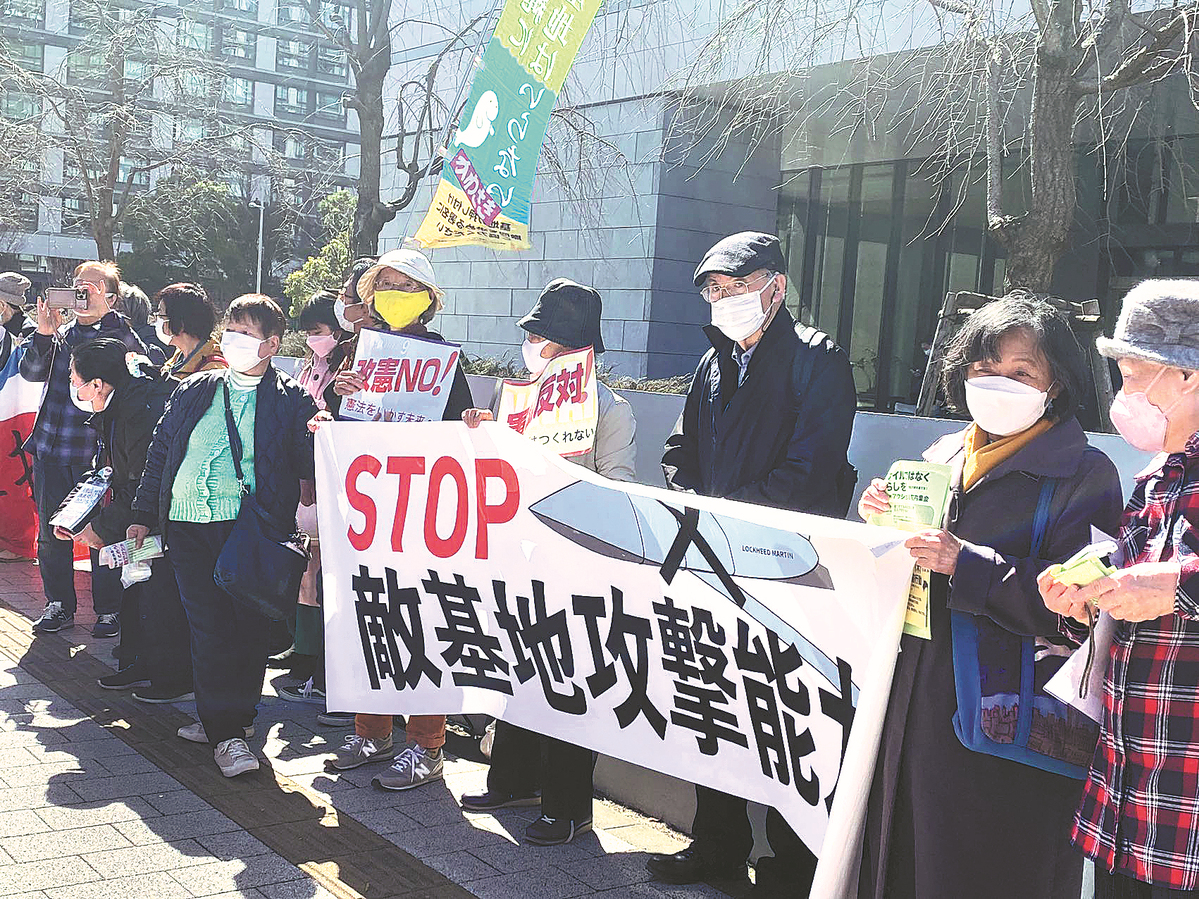Japan's military buildup meets strong opposition

People protest against the high military budget passed by the House of Representatives in Tokyo on Tuesday. GUO DAN/XINHUA
Japan's former prime minister Yasuhiro Nakasone once promised Washington that Japan was the US' "unsinkable aircraft carrier", and his present-day counterpart Fumio Kishida is now building it at lightning speed.
As Japan's House of Representatives approved a record 114.38 trillion yen ($840 billion) budget for this fiscal year on Tuesday, including 6.82 trillion yen in military spending, experts said the country is going all-in on Washington, forging itself to stoke conflict in the region.
"It appears to me that 'good listener' Kishida is not very good at listening to the voice of the people," said Liu Qingbin, former professor at the Institute of Advanced Sciences at Yokohama National University, citing stories that Kishida has always credited himself with his ability to listen to the public.
Liu's words resonated strongly as opposition parties and groups rallied against the increase in defense spending.
Days before the lower house's approval, more than 70,000 people throughout Japan signed a petition demanding that the government retract its plan, concerned that more defense spending introduces the possibility of preemptive attacks on enemy bases.
In a protest outside the country's parliament on Tuesday, Mizuho Fukushima, head of the Social Democratic Party, said that instead of military spending, Japan should invest more in areas such as education and social security, and in helping small and medium-sized companies recover from the pandemic.
At the same time, the Democratic Party for the People has said it will not support the budget, citing as one of its reasons its opposition to government plans to raise taxes to increase defense spending.
However, with a majority of seats in the lower house controlled by the ruling coalition of the Liberal Democratic Party and its smaller partner Komeito, the budget will now go through deliberation by the upper house but will automatically take effect in 30 days regardless of its attitude to the plan.
Hiromori Maedomari, a professor at Okinawa International University, criticized the budget as "a first step toward a wartime regime".
"If we left the parliament alone to decide, Okinawa could be turned into a battlefield," he said.
Atrocities recorded
Liu said the Japanese military committed some of the worst atrocities in recorded history before and during World War II so it is reasonable that Japan reassures its neighbors that its military buildup is for defensive purposes.
"However, Japan's actions belie its claims as it seeks first-strike capabilities against enemy bases in a potential conflict," Liu said.
What is worse is that US policy cognoscenti have turned a blind eye to the legitimacy of Asian objections, and as a result, it threatens Japan's greatest bulwark against fascism, its constitutional commitment to pacifism, he said.
Photos
Related Stories
- How long will Fukushima’s nuclear-contaminated water affect the world?
- Japan beefs up moves in seeking G7 support for wastewater dump
- Japan covets G7 endorsement on radioactive water discharge
- Commentary: Toxic U.S.-Japan collusion on nuke wastewater taints global environment
- Japan shouldn’t bind itself to ‘detonators of US military’
- Japan PM sacks top aide over anti-LGBT comments
- Japanese PM's G7 tour seeks gang-up, growing int'l presence
- Japanese public opposes plan to dump radioactive water into sea
- Interview: Japan's unilateral radioactive wastewater discharge irresponsible, harmful: green activist
- Japan's central bank raises views of 4 regional economies as activities pick up
Copyright © 2023 People's Daily Online. All Rights Reserved.









